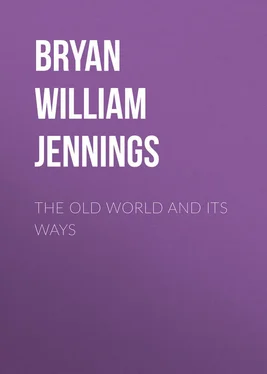William Bryan - The Old World and Its Ways
Здесь есть возможность читать онлайн «William Bryan - The Old World and Its Ways» — ознакомительный отрывок электронной книги совершенно бесплатно, а после прочтения отрывка купить полную версию. В некоторых случаях можно слушать аудио, скачать через торрент в формате fb2 и присутствует краткое содержание. Жанр: foreign_antique, foreign_prose, на английском языке. Описание произведения, (предисловие) а так же отзывы посетителей доступны на портале библиотеки ЛибКат.
- Название:The Old World and Its Ways
- Автор:
- Жанр:
- Год:неизвестен
- ISBN:нет данных
- Рейтинг книги:4 / 5. Голосов: 1
-
Избранное:Добавить в избранное
- Отзывы:
-
Ваша оценка:
- 80
- 1
- 2
- 3
- 4
- 5
The Old World and Its Ways: краткое содержание, описание и аннотация
Предлагаем к чтению аннотацию, описание, краткое содержание или предисловие (зависит от того, что написал сам автор книги «The Old World and Its Ways»). Если вы не нашли необходимую информацию о книге — напишите в комментариях, мы постараемся отыскать её.
The Old World and Its Ways — читать онлайн ознакомительный отрывок
Ниже представлен текст книги, разбитый по страницам. Система сохранения места последней прочитанной страницы, позволяет с удобством читать онлайн бесплатно книгу «The Old World and Its Ways», без необходимости каждый раз заново искать на чём Вы остановились. Поставьте закладку, и сможете в любой момент перейти на страницу, на которой закончили чтение.
Интервал:
Закладка:
KOREA – "THE HERMIT NATION."
Poor little Korea! One hardly knows whether to be amused or grieved, so strangely have comedy and tragedy been blended in her history.
Mr. Griffiths in his very comprehensive book bearing that title, calls Korea the "Hermit Nation," and the appellation was a fitting one until within a generation. Since that time she might be described as a bone of contention, for she has been the cause of several bloody quarrels.
The position of Korea on the map of Asia very much resembles Florida's position on the map of North America, and Japan's relative position is something like that which Cuba bears to Florida. Separated on the south from Japan by about a hundred miles of water and joining both China and Russia on the north, it is not strange that all three of these nations have looked upon her with covetous eyes and begrudged each other any advantage obtained. The surface of Korea is quite mountainous, the ranges and valleys extending for the most part from the northeast to the southwest. Until recently the country was inaccessible and few of the white race have penetrated the interior. A few years ago a railroad was built from Seoul thirty-five miles west to Chemulpo, the nearest seaport. Since then the Japanese have built a road from Seoul north to Pen Yang, and southeast to Fusan. The last line, which has been finished less than a year, is two hundred and seventy-five miles long and connects the Korean capital with the nearest seaport to Japan. This railroad is of such great military importance to Japan that she aided the building to the extent of guaranteeing six per cent interest on the investment for fifteen years, with the provision that the cost of the road should not exceed twenty-five million yen. The Korean government gave the right of way for the road and the free admission of material imported for its construction and equipment. The engines and cars are of American style and make, and the road is standard gauge. It is now so easy to pass through Korea in going from Japan to Pekin that the tourist should not miss its strange and interesting sights, but the trip should be made before November. We took the train at Fusan and made the ride nearly all the way in daylight, thus having an opportunity to see both the country and the people. The road crosses three rivers and the water sheds which separate them, making the construction of the road extremely difficult. The mountains are bare, and we were informed that they had been denuded by the natives and the wood used for fuel. The Koreans sometimes blame the Japanese for the appearance of the country and attributed it to the invasion three hundred years ago; an intelligent son of Japan replied that as his country recovered from earthquake shocks within a few years, the Koreans should have been able to remove the traces of an invasion in less than three centuries.
The valleys are fertile but in tillage and in evidences of industry they do not approach the valleys of Japan. One misses the orchards, the trees, the vines and the flowers which are ever present in "The Land of the Rising Sun."
Rice is the principal crop in the south, while barley and wheat are more cultivated in the north. Beans and peas are also raised in large quantities and last year constituted the chief article of export. Rice, while often the largest export, fell below beans and peas that year and was closely followed by hides and ginseng. There are some gold mines, the export of this ore amounting to nearly fifty thousand dollars last year, but the country has been so isolated that its mineral wealth has not been exhaustively explored.
The population of Korea is variously estimated at from eight to fifteen millions. The men are larger than the Japanese and somewhat lighter in color but not so alert. Like the Japanese they have rather a scanty beard, but it seems to be more fashionable for the older men to allow their chin whiskers to grow. In dress the Korean man is unique. He wears a long white coat of thin cotton reaching to the knees, with trousers generally of white, very full in the seat and tied around the ankles. The vest is of red, blue or green if he is not in mourning, but mourning seems to be a permanent occupation in Korea. It was explained to us that white is the color used for mourning and that the mourning period lasts three years. When one of the royal family dies, all of the people wear mourning for the full period, and as they have sometimes had three royal funerals within a decade, white came into general use as a matter of economy.
The hat ordinarily worn is made of horse hair and has a high crown, and being only about a third as large as our hats, it sits upon the top of the head without covering it. It has a narrow brim of the same material and is tied on with strings under the chin. These hats are generally black, although different colors may be seen upon the street; sometimes an enormous straw hat is used for mourning.
The unmarried men wear the hair in one long braid like a Chinese pigtail, but when one marries he combs his hair to the top of his head and ties it in a stiff top knot which is visible through the gauze hat. The foot is encased in a sock, padded with cotton, and a canoe shaped shoe of grass, cloth, leather or wood.
The women, except those of the coolie class, are seldom seen on the street in the daytime, and the men are not allowed on the street at night, or were not until western ways began to invade the island. Even when going out the women wear over their heads a green cape with scarlet sleeves and draw it across the face in such a way that little more than the eyes can be seen. The streets of Seoul and of the towns through which we passed were full of men, many of them walking about in a leisurely way or standing in groups smoking long pipes. Mingled with them were coolies carrying immense packs on their backs or leading ponies, oxen or cows laden with hay, wood or fagots. We saw more idle men in two days in Korea than we saw in Japan in a month. While the coolies seem to be quite industrious and carry astonishing weights, there seems to be a deep-rooted contempt for labor – even among the middle classes, and a contractor told us that in the employing of the coolies it was necessary to pay them every day because a week's compensation would have to be spent before they would return to work. An incident will serve to illustrate the feeling in regard to labor of any kind. In making a purchase we wanted two things tied together with a string. We called the guide's attention to it; he handed the things to his attendant and the attendant handed them to the shopkeeper, who did the tying. We were also informed that the Koreans lack the power of organized co-operation. Each one works by himself and carries his burden on forked sticks strapped to his back. In walking he uses what seems like a staff, but its real purpose is that of a prop for his load when he stops to rest.
The shopkeepers of Korea have the oriental taste for bargaining to a marked degree and always ask a great deal more than they expect to receive, finding, apparently, intellectual recreation in haggling over the price. In making a few small purchases we were very much amused at the spirited discussions which took place between our guide and the merchants. Followed by a crowd of interested spectators, numbering from twenty to fifty, we moved from shop to shop. The vendor would announce a price as if his was a one-price store. The guide would receive the announcement with absolute contempt and the wordy war would begin. The bystanders took sides and joined in the fray; the clerks and members of the storekeeper's family flocked to his aid, while the crowd elbowed each other to get nearer the scene of action. Usually the guide would start toward another store before an agreement could be reached, sometimes less than half of the original price was settled upon, and in the calm which followed the storm, everyone seemed satisfied. We heard of instances where one-eighth of the price asked was finally accepted, but either the merchants with whom we dealt were more reasonable or our guide yielded too soon.
Читать дальшеИнтервал:
Закладка:
Похожие книги на «The Old World and Its Ways»
Представляем Вашему вниманию похожие книги на «The Old World and Its Ways» списком для выбора. Мы отобрали схожую по названию и смыслу литературу в надежде предоставить читателям больше вариантов отыскать новые, интересные, ещё непрочитанные произведения.
Обсуждение, отзывы о книге «The Old World and Its Ways» и просто собственные мнения читателей. Оставьте ваши комментарии, напишите, что Вы думаете о произведении, его смысле или главных героях. Укажите что конкретно понравилось, а что нет, и почему Вы так считаете.












